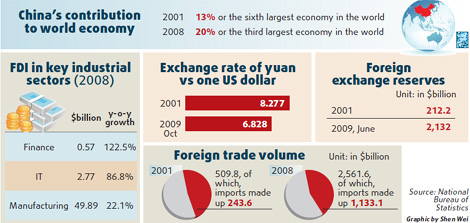Top Biz News
WTO ties rev up nation's growth
By Andrew Moody and Ding Qingfen (China Daily)
Updated: 2009-11-02 08:40
 Keith Rockwell, chief spokesperson for the WTO.
|
Zhou Houjian is one of the beneficiaries of China taking its place at the head table of trading nations.
Within the next few weeks, the country will mark eight years of membership of the World Trade Organization (WTO).
For Zhou, who is chairman of Hisense Electric Co Ltd, one of China's leading flat screen television makers, it has been a period of unparalleled growth.
Before joining the WTO in 2001, the company, which is based in Qingdao in Shandong province, did not export at all. Now 20 percent of its sales are to the United States, Europe, Australia and Africa.
"Our major efforts are now focused on overseas markets. Our aim is to become a leading worldwide company with the majority of our sales being exports. Without China's entry into the WTO, this would have been unimaginable, " Zhou said.
Hisense is far from alone. In the first six months of this year, China overtook Germany as the world's largest exporter with total exports of $521.7 billion, compared to its rival's $521.6 billion.
According to WTO official statistics, China's exports have increased fivefold, or by 25 per cent a year, on average since its accession.
China now has a dominant position in world markets in many sectors, including electronics, textiles and machinery.
A major question is whether China could have achieved such extraordinary growth without joining the WTO.
Wu Changqi, professor of strategic management at the Guanghua School of Management at Peking University, said the answer cannot simply be found in its membership creating better exporting opportunities.
"The effect of joining the WTO has been in making the China economy more open to foreign firms and, consequently, Chinese firms have had to become more competitive. As a result, Chinese firms have also developed a greater edge in overseas markets, and that is why you have seen this rapid rise in trade," Wu said.
Jian Sun, a partner at management consultants A.T. Kearney in Hong Kong, said being a member of the WTO has created a whole new "mindset" in the country.
"Membership in the WTO is all too often just seen in the context of exports. I think it has helped accelerate the development of China because the government has had to become more open and transparent in terms of processes and policymaking," he said.
"I think it is also the case that China is clearly recognized now as part of the global economy as a result of it having joined," he added.
China's membership of the WTO recently came into sharp focus again as a result of the financial crisis. The prospect of major trade wars between countries currently lurks beneath the surface.
China has faced a barrage of accusations that it is failing to play by WTO rules and dumping goods in overseas markets.
According to the Ministry of Commerce, during the first nine months of this year, 88 trade remedy investigations from 19 nations and regions were brought against China covering some $10.2 billion of the country's exports. Fifty of the cases were from the United States and 22 were from India.
Yao Jian, a spokesperson for the Ministry of Commerce, said there is a danger of trade wars breaking out as countries turn against each other.
"When the economies entered into recession, they turned to blame and attack the other nations, including China, rather than find or create possible solutions to make their own industries get better. This is unfair and unreasonable. China is strongly against such moves," Yao said.
Rather than lying down in the wake of these trade actions, the Chinese government is becoming increasingly eager to use the legal framework of the WTO regulatory system to counter them.
Fu Donghui, general manager of Allbright Law Offices in Beijing, said this is in marked difference to when China first joined the WTO.














